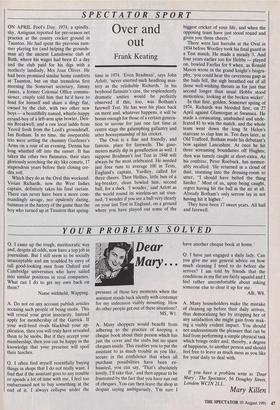SPECTATOR SPORT
Over and out
Frank Keating
ON APRIL Fool's Day, 1974, a spindly, shy, Antiguan reported for pre-season net practice at the county cricket ground in Taunton. He had spent the previous sum- mer playing for (and helping the grounds- man at) the ancient Lansdowne club of Bath, where his wages had been £1 a day and the club paid for his digs with a motherly landlady, Mrs Joan Oliver. He had been promised similar home comforts at Taunton, but on that tremulous first morning the Somerset secretary, Jimmy James, a former Colonial Office commis- sioner, crisply told him that he'd have to fend for himself and share a dingy flat, owned by the club, with two other new boys — a beautifully named, whistle-happy errand-boy of a left-arm spin bowler, Den- nis Breakwell, and a raw local laddo from Yeovil fresh from the Lord's groundstaff, Ian Botham. In no time, the inseparable trio were setting the chummy Gardener's Arms on a roar of an evening. Dennis has long whistled off into the sunset. It has taken the other two flatmates, their stars gloriously scorching the sky like comets, 17 stupendous years before their closing cre- dits roll.
Which they do at the Oval this weekend. Vivian Richards, now the West Indies captain, definitely takes his final curtain. There can never have been a more com- mandingly savage, nor opulently daring, batsman in the history of the game than the boy who turned up at Taunton that spring- time in 1974. 'Even Bradman', says John Arlott, 'never exerted such headlong mas- tery as the relishable Richards.' In his boyhood flatmate's case, the resplendently dramatic unities would be perfectly observed if this, too, was Botham's farewell Test. He has won his place back on merit and, whatever happens, it will be bonus enough for those of a certain genera- tion to savour for just one last time at centre stage the galumphing gallantry and utter hooraymanship of his cricket. The Oval is a fine and friendly, and famous, place for farewells. The gaso- meters matily dip in genuflection as well. I suppose Bradman's last Test in 1948 will always be the most celebrated. He needed just four runs to average 100 in Tests, England's captain, Yardley, called for three cheers. Then Hollies, little bun of a leg-breaker, clean bowled him, second ball, for a duck. 'I wonder,' said Arlott as the world round its wireless-set sat stun- ned, 'I wonder if you see a ball very clearly on your last Test in England, on a ground where you have played out some of the biggest cricket of your life, and when the opposing team have just stood round and given you three cheers.'
There were last hurrahs at the Oval in 1934 before Woolley took his final guard in a Test match. He made a measly 3. And four years earlier too for Hobbs — played on, bowled Fairfax for 9 when, as Ronald Mason wrote in the grand knight's biogra- phy, 'you could hear the cavernous gasp as the bails fell, the sigh breathed out of all those well-wishing throats as for just that second longer than usual Hobbs stood motionless, looking at the broken wicket'.
In that first, golden, Somerset spring of 1974, Richards was blooded first, on 27 April against Glamorgan at Swansea. He made a coruscating, unabashed and unde- feated 81 to win the match, and the whole team went down the long St Helen's staircase to clap him in. Ten days later, at Old Trafford, Botham made his debutant's bow against Lancashire. At once he hit three screaming boundaries off Hughes; then was tamely caught at short-extra. As his confrere, Peter Roebuck, has memor- ably recalled: 'He returned in a cloud of dust, storming into the dressing-room to utter, "I should have belted the thing harder." Most of us, upon being caught, regret having hit the ball in the air at all. Already Botham's only sorrow lay in not having hit it higher.'
They have been 17 sweet years. All hail and farewell.


















































 Previous page
Previous page